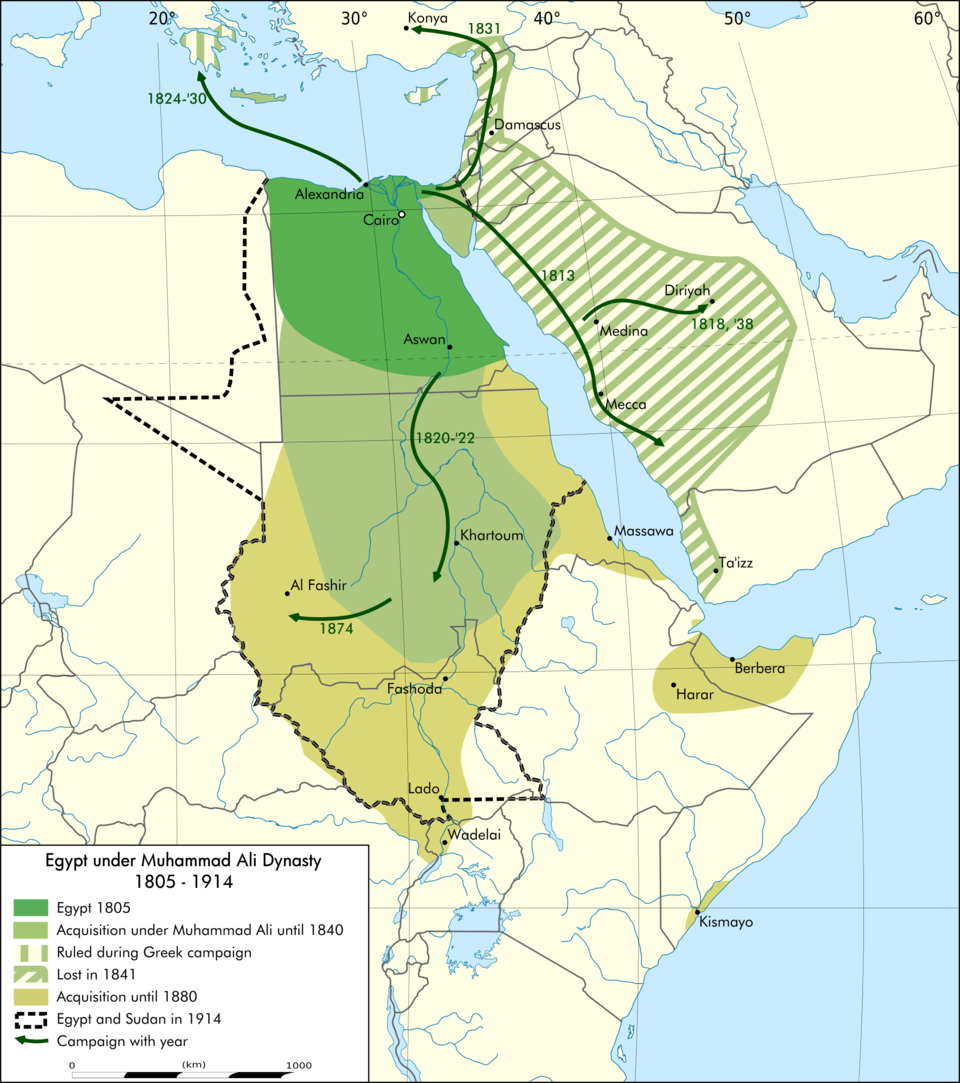IB Syllabus focus:
'Explore challenges faced by the Ottoman Empire, including the Greek War of Independence and Muhammad Ali's actions in Egypt during the early 19th century.'
The early 19th century was a period of significant upheaval for the Ottoman Empire, as it grappled with internal rebellions, the rise of nationalist movements, and challenges to its authority from within its own ranks. The once formidable empire faced a myriad of problems that threatened its cohesion and stability.
Greek War of Independence (1821–1830)
Prelude to Rebellion
The rise of nationalism among the Christian population in the Balkans.
The Phanariotes, influential Greek families in Constantinople, played a key role in fostering Greek national identity.
Sparks of Insurrection
Sporadic uprisings began, inspired by the successful revolutions in the Americas and France.
The Filiki Eteria, a secret society, was instrumental in organizing the revolution.
European Romanticism and Philhellenism
The Greek struggle attracted widespread sympathy in Europe, partly due to the classical revival and romanticism of the time.
Notable figures such as Lord Byron championed the Greek cause, further internationalising the conflict.
The Ottoman Response
The Empire’s military response was initially effective but ultimately undermined by European intervention.
Massacres, such as on the island of Chios, provoked international outrage and further support for the Greek cause.
Consequences of Independence
The establishment of an independent Greek state in 1830, with the signing of the Treaty of Constantinople.
The loss marked the first major shrinkage of Ottoman territory and set a precedent for the empire's disintegration.
Muhammad Ali’s Egypt
Ascent of a New Power
Initially, an ally, Muhammad Ali Pasha, exploited the power vacuum in the wake of the Napoleonic invasions to establish himself as the ruler of Egypt.
Reforms in Egypt
Introduced modern agricultural methods, increasing the wealth and resources available to his regime.
Established state monopolies on key goods, directing the profits towards military modernisation.
Military Engagements
His well-trained and equipped army successfully expanded his rule into Sudan and Syria.

This map shows the territorial reach of Muhammad Ali’s Egypt in the early nineteenth century, including expansion into Sudan and the Levant and the subsequent reduction of control after European intervention. It provides a clear geographic reference for the Ottoman–Egyptian conflicts and the balance-of-power diplomacy that followed. Source
His navy became a formidable force in the Mediterranean.
The Empire Strikes Back
The Ottoman-Egyptian conflict highlighted the empire’s military obsolescence in comparison to Muhammad Ali’s modernised forces.
The subsequent Treaties of Kütahya and Hünkâr İskelesi temporarily halted Muhammad Ali’s advance but did not resolve the underlying tensions.
Shifts in Allegiance
Britain, initially supportive of Muhammad Ali, shifted its stance, fearing his control over the eastern Mediterranean would threaten their interests.
The European powers, through diplomatic pressure and military force, intervened to restore the balance of power in the region.
Aftermath and Legacy
The settlement reduced Muhammad Ali’s territory to Egypt and parts of Sudan, with an autonomous administration under Ottoman suzerainty.
His legacy persisted in the form of a modernised Egypt, which later played a significant role in the politics of the region.
Internal Challenges and Repercussions
Socio-economic Decline
The empire faced a significant financial crisis, exacerbated by military expenditures and territorial losses.
Agricultural decline and plague further impacted the economic stability and population health.
Administrative Decentralisation
The central authority was challenged by the increasingly powerful local rulers, such as the Beys in Tunisia and the Deys in Algeria.
The Janissaries, once the elite soldiers of the empire, became a destabilising force, resisting modernisation and reform.
Intellectual and Cultural Stagnation
A lack of scientific and industrial progress compared to European nations hindered development.
The Ulema, the religious elite, often opposed reforms, viewing them as a threat to traditional Islamic values.
Ethnic and Religious Tensions
The empire’s diverse population often had conflicting interests, leading to sporadic outbreaks of violence.
Non-Muslim communities, particularly in the Balkans and Armenia, sought greater autonomy or independence.
Military Challenges
The Janissary corps' repeated insubordination and eventual abolition in 1826 during the Auspicious Incident showed the deep-rooted problems in military organisation.

Map pinpointing the site of the Janissaries’ barracks in Istanbul, the focal point of the 1826 “Auspicious Incident” in which the corps was crushed and abolished. Locating the barracks helps connect the political-military crisis to a real urban landscape. Source
The need for a modern army was evident, leading to the establishment of the new, Western-style army, Asakir-i Mansure-i Muhammediye.
Efforts to Counteract Decline
The emergence of reformist sultans like Mahmud II, who sought to modernise the empire's institutions.
Initial reforms were often met with resistance and had limited success due to entrenched interests and the empire's vast and diverse nature.
In conclusion, the Ottoman Empire's early 19th-century challenges were characterised by internal fractures, external pressures, and a changing global context. The era was a pivotal one, witnessing the empire's attempts to reassert its dwindling power while navigating the complexities of nationalism, modernisation, and international diplomacy. These issues were not merely temporary setbacks but signs of the empire's slow transformation and eventual disintegration. For the IB History student, these events offer valuable insights into the processes of imperial decline and the seeds of modern national identities.
FAQ
The Serbian Uprising, which began in 1804 and eventually led to the Serbian Revolution, was a major blow to Ottoman authority in the Balkans. It was one of the first successful uprisings within the Empire and a precursor to the later Balkan nationalistic revolutions. The uprising challenged the Ottoman policy of 'Phanariot' administration, where Greek Orthodox subjects were appointed to govern the Slavic territories. After years of conflict and negotiation, the Empire was forced to grant Serbia de facto independence by 1830, recognising its autonomy within the Empire. This loss set a significant precedent for the Empire’s other Christian subjects and demonstrated the weakening grip of the Ottomans on their European territories.
The financial crisis of the early 19th century severely impacted the Ottoman Empire's ability to govern effectively. Exacerbated by military expenditures from constant conflicts and the cost of maintaining an expansive state apparatus, the crisis led to high levels of debt and dependence on foreign loans, particularly from Britain and France. The financial strain hindered the Empire's capacity to invest in necessary reforms and infrastructure, maintain a strong military, and control its provinces. This economic vulnerability made it increasingly difficult to suppress uprisings and respond to external threats, compounding the challenges of administrative decentralisation and contributing to the overall decline in Ottoman governance.
The Plague of 1812 was one of the numerous outbreaks that affected the Ottoman Empire, with significant demographic and economic consequences. It caused widespread mortality, notably in urban centres such as Constantinople, which destabilised the economic and social structures of the Empire. The frequent plagues reduced the Empire's productive workforce, constraining agricultural and industrial output. Furthermore, these epidemics exacerbated the already precarious financial situation of the Empire, limiting trade and decreasing tax revenues. The cumulative effect of such health crises further weakened the capacity of the Ottoman state to maintain order and progress, impeding its response to both internal challenges and the external pressures it was facing at the time.
The Treaty of Adrianople (Edirne), signed in 1829, concluded the Russo-Turkish War (1828–1829) and had profound implications for the Ottoman Empire's control over its European territories. It ceded significant territories to Russia, including the mouth of the Danube, which increased Russian influence in the Balkans and the Black Sea. The treaty also granted autonomy to Serbia and acknowledged the sovereignty of Greece, further eroding Ottoman control in Europe. The Empire's concession to allow foreign powers to intervene on behalf of Christians within its borders set a precedent that would be exploited in future conflicts, thereby weakening the empire's sovereignty and emboldening nationalist movements within its territories.
The Janissaries, initially an elite military corps central to the Empire's military successes, had become a powerful and reactionary political force by the early 19th century. Their opposition to modernisation and reform significantly contributed to the internal challenges facing the Ottoman Empire. They resisted Sultan Mahmud II's efforts to reform and modernise the army, fearing the loss of their privileged status. This resistance culminated in the Auspicious Incident of 1826, where Mahmud II decisively crushed the Janissaries, disbanded the corps, and replaced them with a new, modernised army. The Janissaries' role was therefore pivotal as their actions and eventual downfall reflected the Empire's struggle to transform its military and political institutions amidst internal strife and conservative opposition.
Practice Questions
The Greek War of Independence was a significant factor in the Ottoman Empire's decline, representing the first successful assertion of nationalism within its territories. It served as a catalyst for other nationalist movements, undermining the Empire's control over its Balkan provinces. The loss of Greece also signalled the Empire's vulnerability to European intervention, as evidenced by the decisive role of the British, French, and Russians. This loss of territory and prestige, combined with the Empire's inability to suppress the rebellion, exemplified the weakening Ottoman authority and highlighted the need for reform and modernisation within its military and administrative structures.
Muhammad Ali's leadership transformed Egypt from a nominal Ottoman territory into a virtually independent power. His modernisation efforts significantly enhanced Egypt's military and economic capabilities, challenging the Sultan's authority. The expansion of his rule into surrounding regions and his formidable military campaigns against the Ottoman forces during the Ottoman-Egyptian War evidenced the shift in power dynamics. Although the European intervention curtailed his expansion, it left Egypt as a de facto independent state, further diminishing the Ottoman Empire's influence and showcasing the declining centralised control of the Sultan over outlying provinces.

